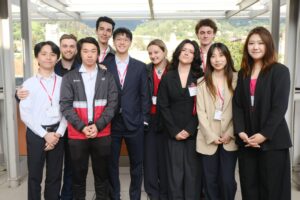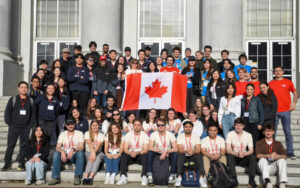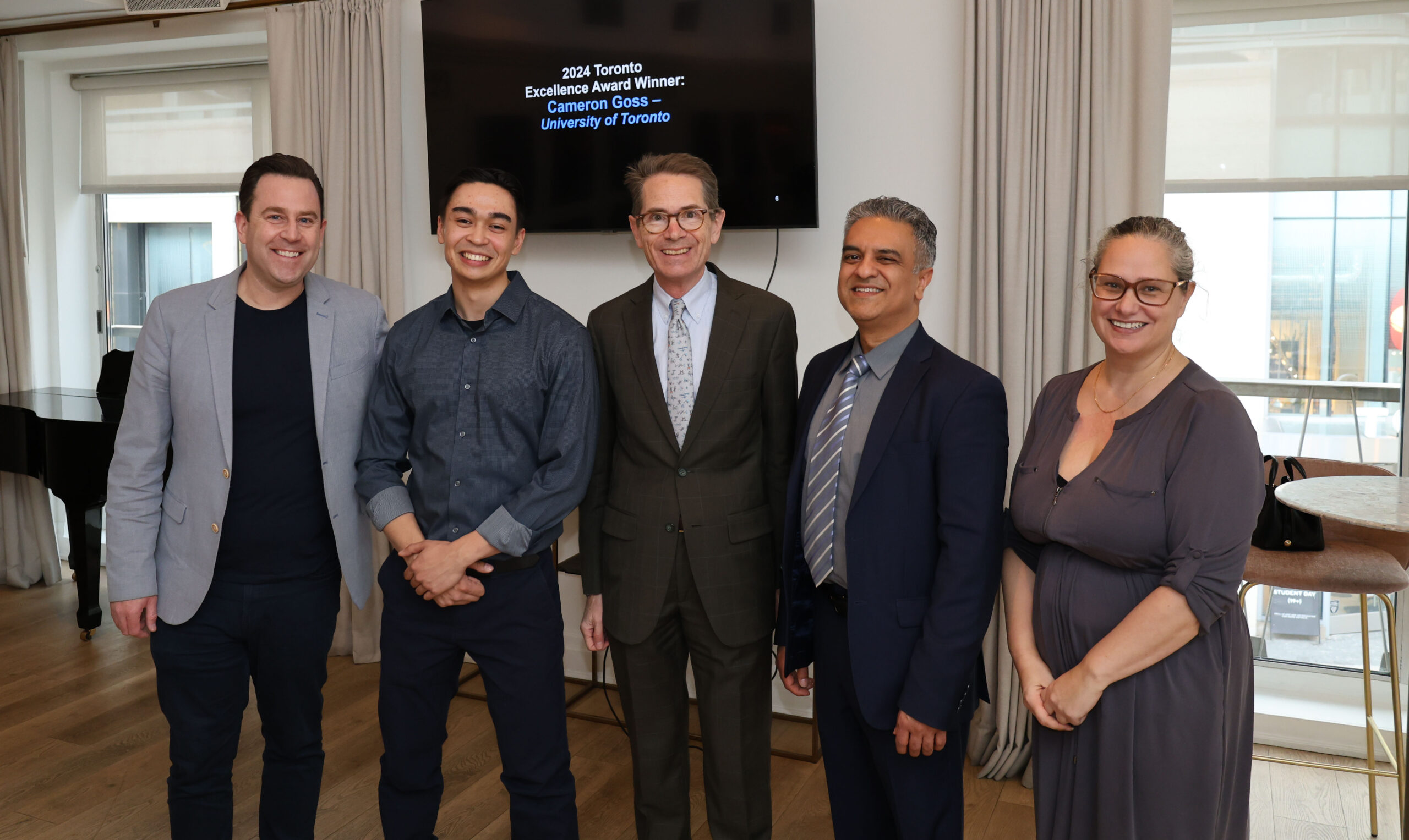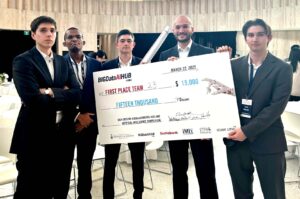April 16, 2025 | Bloomberg
April 5, 2025 | Toronto Star

A team of U of T students earned second place overall at a recent international competition held by the Earthquake Engineering Research Institute (EERI).
The annual Seismic Design Competition (SDC), held at the University of California at Berkeley from March 31 to April 3, saw the U of T Seismic Design Team join four other Canadian universities for a total of 48 teams from institutions around the world.

In essence, teams design a model structure capable of surviving conditions simulating an earthquake. Each team designs a complex tall building model, made from balsa wood, which is tested on a shaking table. They are judged on their oral presentation, summary poster, their model’s architectural design, ability to fit within the design criteria and constraints, analytical prediction of their model performance and response of their model during shaking table testing.
The team of 10 attending the event, comprised of nine Civil Engineering students and one from Daniels Architecture, won first place for Best Architecture and garnered enough points, along with acknowledgment of their damping device and poster, to rate second place overall. This showing is the best U of T has seen at the SDC, bettering a 2022 first-place Architecture award.
Under the guidance of faculty advisor CivMin’s Professor Constantin Christopoulos, and led by co-captains Sacha Morin (Year 3 CivE) and Joyce Zhong (Year 3 CivE), the team constructed their tall building model in Toronto, then shipped it to California.
“We are very proud of the U of T seismic Design Team for this great achievement,” says Christopoulos, recounting the dedication of the team to the tasks and ultimate delivery. “The students put in a tremendous effort for many months, learning new engineering concepts, developing their designs, building numerical models, getting better at building their structure, running shake-table tests, etc. In addition, they showed great organizational skills in putting together and coordinating a large team, finding donors, organizing their trip and finally representing U of T at UC Berkeley so well!“
Isobel Forrest (Year 3 CivE) recounts the logistics of seeing their entry shipped to the venue successfully, “We’d shipped the tower to a nearby UPS store and had been notified it had arrived a day early, so we had the perfect time to pick it up on Saturday. The new shipping method – using a cardboard box rather than a wooden crate – was successful! The tower arrived without any major breaks and the box was light enough for Freddy and Naveen to carry the 20-minute walk to the hotel.”
The most nerve-racking of tests, the shake table, saw U of T secure success with the stability of its design. Forrest relays, “When it was time for our shake, we were pretty confident our tower would survive both ground motions but were still nervous. Of course, our tower survived very well.”
By Phill Snel

A full team roster for the U of T Seismic Design Team:
Co-Captains
Joyce Zhong
Sacha Morin
Logistics
Isobel Forrest
Charlie Miller
Design & Analysis
Luana Zang
Freddy Fisher
Harry Chen
Carman Xu
Fabio Karanja
Mihir Agarwal
Dana Bou Saab
Puneet Cheema
Maya Richman
Architecture
Joseph Chen
Madison Munro
Leila Rashidian
Sharon Kim
Construction
Naveen Black
Kevin Xu
Brian Tobing
Nivin Khan
Noor Aghili
Maryam Rameen
Bans Kim
==
April 5, 2025 | CBC
April 3, 2025 | CBC Online
April 2, 2025 | The Globe and Mail – Globe Drive Urban Mobility Summit

Cameron Goss (Year 4 CivE) was honoured with Pomerleau‘s Excellence Award at their inaugural Toronto Intern Appreciation Dinner on Thursday, March 27, 2025.
Goss successfully completed his PEY Co-op, extending it to an 18-month role, with Pomerleau’s project team at the University of Toronto Academic Wood Tower (UTAT) and was the only student in the Toronto region, out of 14 student winners across Canada, to receive the award.
“Cameron consistently exceeded expectations, demonstrating an unwavering commitment to excellence and a strong drive to embrace new challenges. His growth throughout this internship has been remarkable, and we are excited to see his continued development within the Toronto office and the broader Pomerleau family,” says CivMin alumnus Kristopher Deutschendorf (CivE 1T6+PEY, MEng 1T9) Superintendent at Pomerleau. “It has been a privilege to mentor and work alongside such a talented and dedicated individual.”
Goss reflects on his appreciation for the award and his future career, “This award is a testament to the investment that people like [Deutschendorf], the entire UTAT team, and the Pomerleau family have made in me. I’m excited to return to Pomerleau this spring to continue learning and take on the challenges this industry has to offer.”
This event was the last of the Pomerleau Intern Appreciation Dinner series after previously hosting events in Halifax, Vancouver, Victoria, and Ottawa. These gatherings brought together students from multiple universities, mentors, leaders and Pomerleau’s academic partners. This past year, 65 students completed 80 internships in the Atlantic Region, Ontario and British Columbia, with only 14 students across Canada receiving recognition with the Excellence Award. They gained hands-on experience, growing their skills, and making meaningful contributions to the company’s projects.
By Galina Nikitina

A team of U of T students won first place at the sixth iteration of the University of Toronto IMI Big Data and Artificial Intelligence Competition on Saturday, March 22, 2025. The competition is hosted by the University of Toronto Institute for Management & Innovation (IMI) at the University of Toronto Mississauga Campus (UTM).
Team members include CivMin graduate students Sebastian Villada Rivera (CivMin MASc student), Mwendwa Kiko (CivMin PhD student), Timotéo Frelau (CivMin PhD student) and Hesam Rashidi (CivMin PhD student) and Computer Science student Jacob Klimczak (Year 3 CompSci).
The team presented their Agent-based simulation and contrastive denoiser model thesis at the finalist presentation at the Innovation Complex at UTM. Alongside the finalist presentation, the team also competed in the poster competition, showcasing their work to a general audience. The team finished first in both the finalist competition and the poster competition, winning a total of $15,500. The event offers a total prize payout of $30,000 for competitors.
The competition, primarily sponsored by Scotiabank, invites undergraduate and graduate students across all the University of Toronto to showcase their capabilities in computational science, math, and statistics. As part of the competition, students develop cutting-edge machine learning models to support financial institutions and law enforcement in the fight against financial crime. The theme of this year’s competition was “identifying anomalies in financial data”, where competing teams were tasked with developing novel solutions to detect anomalies in synthetic customer data. Over 350 students across 72 teams registered in the competition.
March 21, 2025 | Bay Ward Bulletin